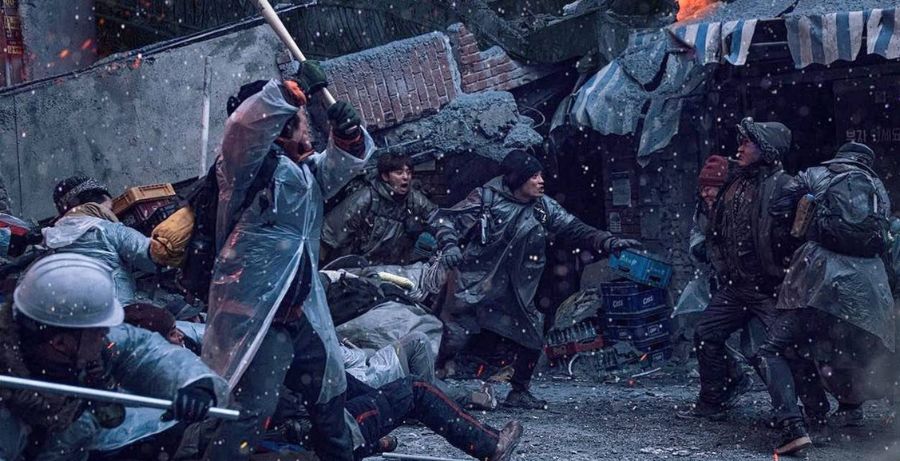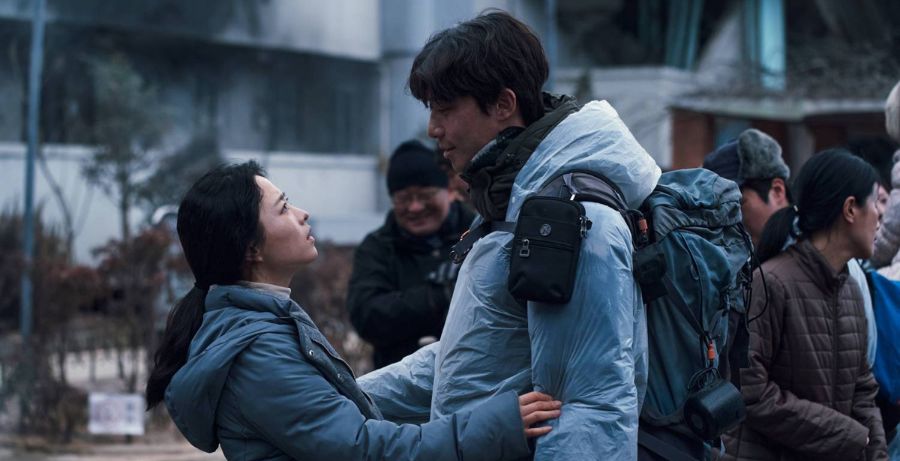A good disaster film needs to focus in on the human elements of each, capturing the nuanced ways in which humanity is warped by circumstances around them. A big blockbuster disaster film can be fun but the ones that make the audiences see themselves in the situations and ask the question, “What would I do?” Adding to the long list of stellar South Korean disaster films is Concrete Utopia. Directed and written by Um Tae-hwa with Lee Shin-ji also serving as a writer, the film is adapted from the WEBTOON Pleasant Bullying by Kim Soongnyung.
Concrete Utopia doesn’t focus on the lead-up to disaster or the disaster itself; instead, we step into the Imperial Palace Apartments sometime soon after mass destruction struck South Korea in the form of what is presumably an earthquake. Centered first on Min-sun (Park Seo-jun), a public servant, and his wife Myeong-hwa (Park Bo-young), a nurse, we see what daily life in the last intact apartment complex in the area looks like. Surrounded by nothing but collapsed buildings and raised earth, the apartment complex is the only reprieve from the bitter cold and hunger.
When outsiders begin to cause problems in the complex, the residents come together and elect Young-tak (Lee Byung-hun) as their Resident Delegate and leader, using him to help enact the tough choices and drive the outsiders away from their complex. This is where the narrative finds its stride after a small amount of worldbuilding.
The audience is pushed directly into a character drama that just so happens to be taking place in a lone highrise in the middle of a leveled city. Concrete Utopia bares its teeth as it lays out a parable about South Korea’s unique relationship with class and real estate and what lengths homeowners will go to to keep their homes.

Concrete Utopia is another in a long line of Webtoon adaptations in the last few years, but by focusing on just one aspect of the story instead of adapting a swath of episodes, director Um Tae-hwa captures something unique and his own. By honing in one specific element of the story, there is so much more set to take place with the series Concrete Market confirmed and a film called The Wilderness already set.
Even without those already confirmed upcoming projects, Concrete Utopia does stand alone. That said, director Um is able to create such a vast world with layers of details that make it feel like if you turn right instead of left, you would find another story, another group, and another take on surviving in a now-apocalyptic world. That is a testament to Um’s skill and ability to create a lived-in yet expansive world without the need for exposition.
Beautiful and dangerous, the way that the cold environment is captured atmospherically is stellar. With landscapes that show off a world with many sinkholes and destroyed buildings outside of view, it all feels epic. But the environment is just one part of the recipe. Disaster films are fun watches because we get to see people battle the elements, struggle to survive, and make hard choices. In Concrete Utopia, Um focuses on the last of these.
The sister is the backdrop of Concrete Utopia, not the entire story.

Yes, we see hints of the disaster, but how the world got this way doesn’t matter. Yes, we see the lengths that people go to for survival, but Um makes sure to never present that brutality as the only option. Instead, every single thing that happens in the apartment complex is an active choice. Not being forced into it by a climactic disaster, each choice holds more weight, allowing people’s hypocrisy, cowardice, and selfishness to take center stage.
Pulling the audience in, the director asks us, sitting in our theater recliners, to join in. What would we choose? How would we treat our neighbor, and when we choose an act of either passive or active violence, how would we reason it away?
A character-driven film, we see the choices and the weight they carry through two men, primarily Young-tak and Min-sun. Group think, and secondary characters are also on display, but the narrative’s dynamic nature thrives as we look at the two men in opposition and in conversation with each other. Two leading men, Lee Byung-hun and Park Seo-jun, are transformed in Concrete Utopia, flexing their acting muscles and embracing the uglier sides of humanity to do so.
For Young-tak, Lee Byung-hun is effortlessly charismatic, manic, and pathological. Actor Lee has long been an inspired choice for complex characters. With his ability to switch demeanors on a dime and a piercing gaze that can be intimidating one minute and welcoming the next, as the resident delegate, he gets his hands dirty so that others don’t have to.
There is a loneliness to him that he carries in every scene at the beginning of the film, shrinking from others and passing responsibility. Then, at the midpoint, he sharply turns into a leader who will do anything (provoked or otherwise) to defend the apartment complex. As he moves between the two character distillations, Lee Byung-hun plays the role with much more beneath the surface, hinting at secrets kept without sowing too much distrust.
At the same time, Park Seo-jun delivers his best performance yet. Deeply nuanced, actor Park plays Min-sun. A public servant and loving husband, Min-sun is pulled onto the anti-crime committee, tasked with following Young-tak and the other men (ages 16-60) out into the cold wasteland outside of the apartment complex.
Park Seo-jun and Lee Byung-hun are a dark and dynamic pair.

Crawling over dead bodies and seeing the faces of those he helped turn away, the entire runtime of Concrete Utopia shows him breaking, slowly, steadily, his morals caving in until only Young-tak’s authority and the apartment complex rules remain. Undergoing the most growth throughout the narrative, Min-sun stands as a character under pressure, scared about his survival and broken by what he’s seen.
South Korea’s entry into the 2024 Oscars, Concrete Utopia is an emotional force of a film. Not concerned with the disaster itself or the spectacle of CGI it could employ to focus on the moment of tragedy, the film offers epic landscapes but always keeps an intimate eye on the people in the high rise. That intimacy helps make the film’s action deliver great impact. Whether its the physical fight scenes or how characters interact with their environment, all of the action in the film serves to build up each character’s emotional core.
Director Um Tae-hwa hones in on the people and highlights the ways in which humanity is deeply flawed and how those flaws shine brightly when there are decided hierarchies even in a world where you’ve lost everything. And even then, while Um Tae-hwa’s narrative is based on us versus them, he never loses sight of investigating who gets to choose which side of the apartment door you fall on.
Concrete Utopia was screened as a part of the Fantastic Fest 2023 program.
Concrete Utopia
-
Rating - 10/1010/10
TL;DR
Director Um Tae-hwa hones in on the people and highlights the ways in which humanity is deeply flawed and how those flaws shine brightly when there are decided hierarchies even in a work where you’ve lost everything. And even then, while Um Tae-hwa’s narrative is based on us versus them, he never loses sight of investigating who gets to choose which side of the apartment door you fall on.







